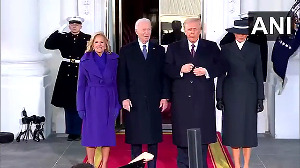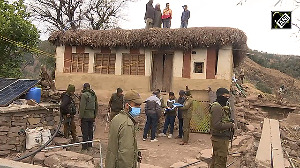Every ruler of men and minds since time immemorial has longed to leave his legacy behind -- some through grandiose physical ones like the Taj Mahal or the pyramids; some leave behind a revolutionary thought, a philosophy, like Krishna, Gautama, Jesus Christ and Mohammed; but most die trying.
The exceptions are rare, almost non-existent. I was reading Michel Danino's riveting book The Lost River, on the Saraswati which was the cradle of the civilisation posterity has exclusively credited to the Sindhu/Indus, and was amazed to find that the remains have no pointer to the ruler/s. No grand places. No temples. No monuments. Nothing. Just urban conglomerations.
In fact, early English excavators with their Egyptian and Roman background even dismissed the archaeological findings as unspectacular. Who ran the vast swathe of settlements on the banks of the Saraswati whose impeccable urban order we are unable to replicate 5,000 years later in our cities? We don't know because the rulers didn't think that was important.
If only our modern rulers thought along those lines, better would be our lot. Instead they choose to run after a legacy, making a grand statement, little realising that legacy is what happens when you do your job well. So we've had prime minister after prime minister tilting at the scales, chasing a dream.
Nehru may have wanted to be known as the champion of global peace and India-China brotherhood but we best remember him as the architect of the modern nation-State; Indira Gandhi may have wanted to better her father, but we remember her for creating Bangladesh, imposing the Emergency and okaying Operation Bluestar; with her son it was a case of what could have been rather than what he did or did not do.
P V Narasimha Rao, for instance, did not set out to leave a legacy when he liberalised the economy, he just didn't have a choice given what profligate governments before him had done. In fact, despite his vast intellectual superiority, I don't think even he could have foreseen how his decision would unleash a dormant nation. Today, his party may demonise him for the Babri Masjid demolition but no one can take away what he did to the Indian spirit in 1991.
Similarly, Atal Bihari Vajpayee did not set out to leave a legacy when he detonated the bomb in 1998. But by staring down the international pressure that followed, he gave his people tremendous self-belief. And when he stepped down in 2004, we knew for the first time that non-Congress governments can run the nation better. That was his legacy.
Neither Rao nor Vajpayee strove to be remembered -- they did what they had to do, and when it is consonance with the national spirit, as it was for them, legacy was created.
Manmohan Singh, Rao's finance minister in 1991, obviously doesn't think the economic liberalisation was his legacy, so when he got the unexpected chance in 2004 to be remembered by posterity he grabbed it with both hands. The Indo-US nuclear deal may have been the culmination of what Vajpayee's government had done in the previous term, but Dr Singh left his mark by staking his government's future for America's embrace.
The War on Terror may have gone wrong and America in general may be reviled in the Arab world and elsewhere but India has been unique in that the superpower enjoys enormous popularity here, especially among the large, clamorous and influential middle class which equates socialism with deprivation and American capitalism with prosperity.
So when Dr Singh docked the Indian ship of state next to Washington DC's berth five years ago this Sunday, he brought foreign policy in line with the people's wishes -- and that will always be his legacy.
In his second term, when he is running after another legacy -- something that's never been done before -- he is being not just greedy but even stands to lose it all. Perhaps he needs to be told that peace with Pakistan has been given a shot by every single prime minister before him -- and I don't think anyone walked extra miles for this than Vajpayee; the attempts failed not because they lacked conviction but because the issue is far too complex.
Plus, if you remove the Wagah border brigade and the peaceniks who come alive every now and then, there is no groundswell within India in favour of peace. Ask anyone and they will tell you yes, peace is desirable with Pakistan but at what cost, do they really want peace?
Dr Singh's own Congress party, with its elephantine memory, knows it and hence its lukewarm response to the prime minister's ambition.
His own ministers know it.
When it comes to peace with Pakistan, it won't be wrong to say that Dr Singh stands completely alone in his government, in his party and in his nation.
I wish somebody would tell the prime minister that peace with Pakistan is a good thought. Indians and Pakistanis can be friends but India and Pakistan can never be friends in our lifetime. Maybe after another 30, 40 years, when a generation that is untouched by the past comes to power in both nations, it could be come a reality -- assuming that the two nations don't bomb each other out in the meantime.
For the present, the people are not enthused by peace with Pakistan because it doesn't matter to them anymore. The common belief is that India has left Pakistan far behind in the global sweepstakes and while yes, if its hidden war on us were to stop we can progress even faster, we have done well without them so why bother?
Peace with the neighbour obviously means greater dividends for Pakistan than it does for India.
Things could be different if those extending the hand of friendship in Pakistan are able to make some minimum guarantees, they will be surprised by what India can and will offer in return, but it is an open secret that the nation that broke away from India over the two-nation theory is itself a living example of two nations in one today.
One is the civilian one we see, where elections are held, the president, prime minister and others are selected and who run the nation for all practical purposes.
The second nation is the real one, it is the one that calls the shots on critical issues -- and India is a hyper-critical issue for them. It is possible that Messrs Zardari, Gilani, Qureshi et al have a burning desire for peace with India matching Dr Singh's -- but unfortunately for them, the decision is not theirs to take.
Dr Singh can deal with them till the cows, bulls and every animal on Noah's Ark come home but each time he will realise that it's always back to square one. Hopefully someday soon he will outgrow his magnificent obsession.
There's a nation full of problems waiting for that day.
ALSO READ:Lack of preparation hampered Indo-Pak talks
Pak generals don't want the India talks to succeed






 © 2025
© 2025